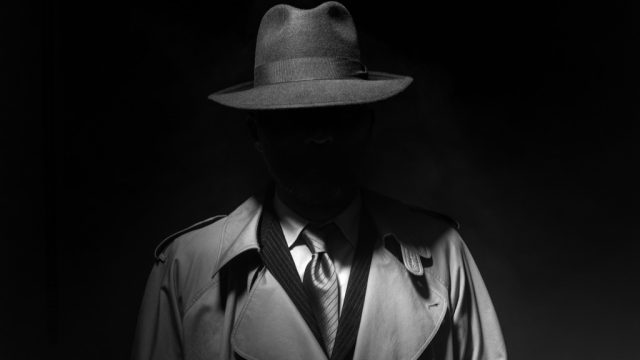17 Genius Ways to Lie Like a Spy

Unless you’re a compulsive liar or a professional con artist (honestly, we hope you’re neither), you probably find that lying doesn’t come naturally to you. Let’s be clear: that’s a good thing.
Now, we’d never encourage you to take up the dark art of deceit, but there are cases in which lying is actually a good thing, and it would behoove you to be a little better at it. To help you out, we asked people whose jobs it is to assess whether someone is being honest with them—CIA officers, poker champs, law enforcement officials, therapists, and more—to get their insights on how to avoid getting caught when you’re trying to tell a whopper. So read on, and good luck!
1
Trust Your Skills

One of the biggest ways to give away that you aren’t telling the truth is when you lose your confidence and convince yourself that the person you are lying to knows you aren’t giving them a straight answers. In fact, there’s a good chance they have no idea, and if you just trust yourself you’ll likely get away with it.
“Humans only correctly identify lies at a rate of about 50 percent,” says Andrew Bustamante, a former covert CIA officer who lived undercover for nearly a decade. “That means there is always the ‘shadow of doubt’ when someone tries to assess whether you are lying or being truthful. Remember that you have the advantage because only you know with 100-percent certainty that you are lying.”
2
Stick to Your Story

This might seem obvious, but even the smallest adjustment to your story is likely to raise suspicions in a skeptical listener. “If you change anything about your original story, you introduce contradiction and degrade credibility,” says Bustamante. “Even bold-faced lying will be accepted as ‘possible truth’ as long as you keep your story consistent. Don’t believe me? Watch the debates between Barack Obama and Mitt Romney in 2012.”
Know what your story is down to the smallest details, and don’t veer away from it from one telling to the next.
3
Keep Your Lies Believable

Bustamante emphasizes that in general “people always assume honesty”—but only if your lies are believable.
“Keep your lies within the realm of reality and you will nearly always convince the person sitting across from you,” says Bustamante. “Lie about your age within five years, your height within two inches, and your salary within $15k and nobody will ever catch you.”
4
Avoid Knowing Things You Don’t Want to Reveal

One of the best ways to avoid looking like a liar is to not know whether you are lying at all.
“Professional poker players will deny information to themselves so that they can’t reveal any secret information,” says Michael Josem, a poker security expert.
He gives the example of a pro poker player who might not even look at their cards until it is their turn to act, so that even if they had a bad habit of subtle reactions to their cards, players who have to act earlier can’t learn anything from them.
“Similarly, they can avoid looking at community cards until it is their turn—and instead spend that time focused on observing opponents,” he says.
5
Keep Your Mouth Shut

Another effective way to avoid being caught in a lie is to keep your chit-chat to a minimum. Only say what you absolutely must, reducing the chances that you’ll say something suspicious—or that your body language will give you away.
“If you’re playing poker against a sophisticated opponent, in general, you will want to reduce the information that you give to them,” says Josem. “Rather than try to trick someone or lie to them, you are much better off to minimize the amount of information you give, than to try to trick them.”
6
Respect Repetition

Body language is often a deadlier giveaway than any words coming out of your mouth, so just as you want to minimize your conversation, the same is true of your body language. Act natural, but keep your movements limited.
“Fundamentally, poker is a game of information, and the more information you give to an opponent, the more likely they’ll make a good decision,” says Josem. “Thus, two sophisticated players will try to control their bodies to behave in a very repetitive manner each hand—so that as little information as possible is being given off.”
7
Ground Statements in Truth

If you’re going to lie, keep as much of it as true as you can.
“Within your story, the foundation and many of the facts should be something that is true and something you know well,” says Laura MacLeod, a therapist and HR expert and creator of From the Inside Out Project.
She gives the example of your running late to meet with your partner, perhaps because you’ve been shopping and spending more money than they would like. The story you tell your partner can include your trip to the store, your purchase of necessary items and/or your attempt to find necessary items and maybe that the store was crowded and you had to wait in line—everything except the overspending you did at the cash register.
“The point is you can sell this,” says MacLeod. “You know the store, what they sell, how crowded it can get, inefficiency of clerks, etc. When you speak about what you know, it’s easier to commit to it. When you commit, your listener will too.”
8
Keep it Light

Defensiveness is a dead giveaway that you have something to hide. If the person you are speaking with raises questions about your story, keep things light, cheery, and casual.
“If you are questioned, smile,” says MacLeod. “This immediately takes the heat off you and paints you as totally innocent. Attempt to help the listener get it: ‘Not sure what you don’t understand. You know how slow those clerks are at X store—remember the time we waited 15 minutes to get a price?’ Getting the attention off you and using what you know throws your listener off.”
9
Breathe

Fidgeting, swallowing often, or showing a general sense of tension are some typical nonverbal ways that liars reveal themselves, according to Ashley B. Hampton, Ph.D., a licensed psychologist and owner of Psychology, Consulting, & Evaluations, LLC. And one of the most effective ways to get these tics under control? Steady breathing.
“Breathing slowly helps reduce anxiety, which will help with the sweaty palms and the feeling of cottonmouth making someone swallow often,” she says.
10
Be Present

“Being in the moment and focusing on the conversation is one way to help reduce blood pressure and eyes darting around the room,” adds Hampton.
If you can stay fully focused on the person you are speaking with and feel present, rather than distracted or preoccupied, the information you are conveying will come across as much more congruent and believable.
11
Stick to the Subject

According to body language expert Patti Wood, author of Snap: Making the Most of First Impressions and Charisma, habitual liars are likely to switch the subject when they’ve been caught in a lie or when the person they speak with raises questions about their version of events.
“Truth tellers won’t give up the conversation until they convince the person who thought they were lying that they’re telling the truth,” she says. “Liars want to change the subject and end the conversation, saying, ‘I don’t want to talk about it’ or try to switch the subject or distract the person.”
12
Avoid Categorical Statements

Similar to changing the subject, liars will tend toward oversimplifications or absolute statements, according to Wood, who gives examples like, “I would never lie,” or, “I’m not that kind of person,” as the kind of flimsy defense you might hear from someone who is not being entirely honest. Instead, a more nuanced response to the specific issue being questioned is more likely to be perceived as honest.
13
Answer Questions with Questions

A good liar only lies as a last resort. Instead of issuing an utter falsity, they’ll answer a question with another question. Here’s an example: Let’s say you’re asked point-blank about some less-than-commendable behavior—stuff you most certainly did, but might like to deny. (“Did you really blow a grand on those boots?”)
Instead of outright saying something simple and deniable like, “No way!,” retort with something along the lines of, “C’mon, how dumb do you think I am?” Chances are, your inquisitor will drop the topic on the spot. They wouldn’t want to insult your intelligence, now, would they?
14
Make Sure It’s Not Verifiably False

Don’t offer up any facts that could easily be double checked, and proved wrong, says Bruce Hurwitz, a recruiter and career counselor, who gives the example of claiming you were late “because of an accident” when a few questions or a check of the traffic report could reveal that no accident happened along the route you claimed it did.
“That’s the beauty of the ‘My dog ate my homework’ lie,” he says. “Go prove it!”
15
Maintain Eye Contact

“You must be able to ‘sell’ the lie,” says Hurwitz. “You must make and maintain eye contact and have good posture. If you look away, or your shoulders droop, or you fidget, that can be interpreted as a sign of nervousness or lack of confidence. Honest people do not need to be nervous and do not lack confidence.”
16
Maintain Your Facial Expression

Likewise, you should not be making wide-ranging or fast-changing facial expressions if you want to be believed.
“Do not change your facial expression,” says Hurwitz. “If you believe that the person to whom you are speaking believes your lie, and you smile, that may give the lie away.”
17
Go With Your Gut

“If people overthink their lie—if they are overly conscious that they are lying—then it becomes too much pressure and they get flustered, and the deception becomes obvious,” Neil Wood, a former undercover cop, told Vice News. “If you have to think about it too much, that’s what gives you away.”
In other words, there’s no need to do a ton of homework on a mark. There’s no need to memorize a hundred canned statements and contingency phrases. Just, in the moment, go with your gut. If you’ve internalized the preceding advice, the lies will flow like water—and no one will suspect a thing. And if that makes you feel a little guilty, well, This Is Why Lying Is Good for You.
To discover more amazing secrets about living your best life, click here to follow us on Instagram!